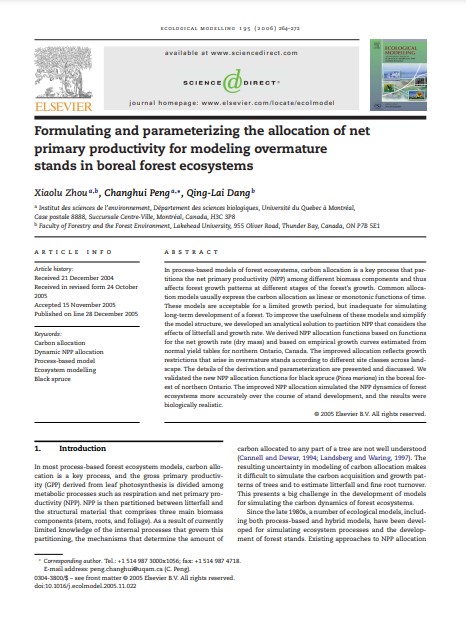Formulating and parameterizing the allocation of net primary productivity for modeling overmature stands in boreal forest ecosystems
Bosque Modelo:
Lake Abitibi
Temática:
Economía sostenible
Tipo de documento:
Artículo científico
Resumen
In process-based models of forest ecosystems, carbon allocation is a key process that partitions the net primary productivity (NPP) among different biomass components and thus affects forest growth patterns at different stages of the forest’s growth. Common allocation models usually express the carbon allocation as linear or monotonic functions of time. These models are acceptable for a limited growth period, but inadequate for simulating long-term development of a forest. To improve the usefulness of these models and simplify the model structure, we developed an analytical solution to partition NPP that considers the effects of litterfall and growth rate. We derived NPP allocation functions based on functions for the net growth rate (dry mass) and based on empirical growth curves estimated from normal yield tables for northern Ontario, Canada. The improved allocation reflects growth restrictions that arise in overmature stands according to different site classes across landscape. The details of the derivation and parameterization are presented and discussed. We validated the new NPP allocation functions for black spruce (Picea mariana) in the boreal forest of northern Ontario. The improved NPP allocation simulated the NPP dynamics of forest ecosystems more accurately over the course of stand development, and the results were biologically realistic
Información Bibliográfica
Autor:
Zhou, X, C Peng and Q-L Dang.
Revista:
Ecological Modelling
Año:
2006
N°:
-
País :
Canadá
Páginas:
264 - 272
Volumen:
195
Idioma:
Ingles
Palabras claves
Carbon allocation Dynamic NPP allocation Process-based model Ecosystem modelling Black spruc





